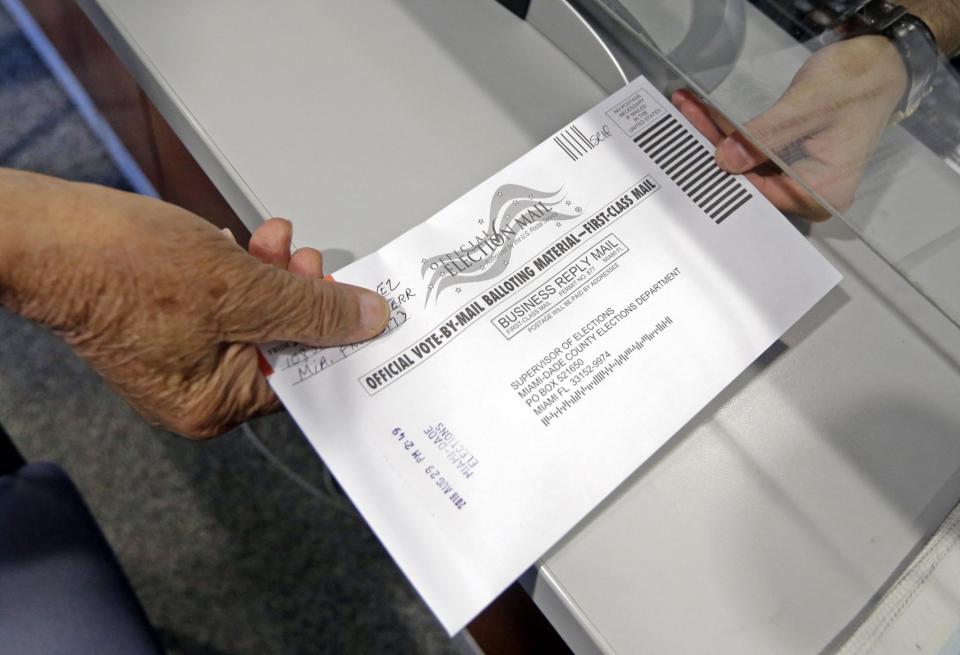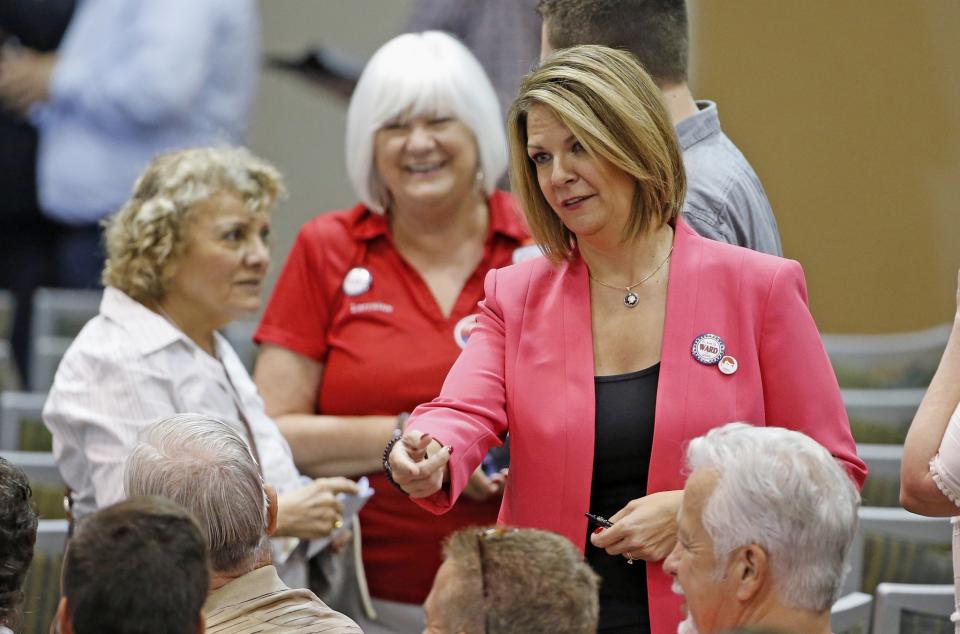Down Ticket #7: Rubio. McCain. Wasserman Schultz. Why Tuesday’s primaries in Florida and Arizona matter.

Down Ticket is Yahoo News’ complete guide to the most fascinating House, Senate and governors’ races of 2016. Coming to you every Tuesday and Thursday until Nov. 8. What you need to know today.
_____
Happy Florida Primary Day! Here are four storylines to watch as the results come rolling in.
If we had to pick just one state to watch for the rest of this election cycle, Florida would be it.
Forget about the marquee slugfest between Donald Trump and Hillary Clinton. As
“SNL’s” Stefon might say, the Sunshine State’s down-ballot races have everything:
– A former GOP White House candidate, Marco Rubio, who solemnly vowed not to run for reelection to the Senate this year — then decided to do it anyway.
– A Democratic Senate primary between a guy who has been accused of padding his résumé (Rep. Patrick Murphy) and a guy who has been accused of abusing his now ex-wife (Rep. Alan Grayson).
– A race for the latter’s U.S. House seat that features both his current wife, Dena Grayson, and one of his top congressional aides, Susannah Randolph.
– A Democratic congresswoman, Corrine Brown, who is running for reelection while simultaneously being tried in a federal corruption case.
– Another Democratic House contest that pits a former candidate for lieutenant governor, Annette Taddeo, against her close friend and mentor, Joe Garcia. Garcia is a former congressman whose chief of staff was sent to jail in 2013 for orchestrating a fraudulent ballot scheme.
– A former Republican governor, Charlie Crist, who is now running for the House as a Democrat.
– And a recently dethroned chairwoman of the Democratic National Committee, Debbie Wasserman Schultz, fighting for her political life against a nationwide movement of disgruntled progressives — including her party’s 2016 presidential runner-up, Bernie Sanders.
Not to mention the fact that 24 of the state’s 27 congressional districts were redrawn last year after the Florida Supreme Court ruled that the old map was unconstitutional.
It’s basically the electoral version of the Florida Man meme, except with serious implications for control of Congress and the political direction of the nation as a whole.
Oh, and the Sunshine State’s primaries are today — meaning the fall campaigns are about to begin in earnest. If you haven’t tuned in yet, now is the time.
Here are four storylines to watch — all of them with national implications — as Floridians go to the polls.
1. Can anyone else pull a Trump?
Donald Trump may have defeated Marco Rubio by a dizzying 19 percentage points in Florida’s March 15 presidential primary — even though Rubio is a Florida native who has held elected office in the state, in one capacity or another, for nearly 15 years. But that doesn’t mean Trump’s signature blend of hard-edged nativism and politically incorrect bomb-throwing is producing the same sort of results for Republicans who aren’t Donald Trump.
Quite the opposite, actually.
Take Carlos Beruff. When Rubio reversed himself and entered the Florida Senate race at the last minute — literally two days before the June 22 deadline — most of the other GOP candidates dutifully stepped aside.

Not Beruff. Instead, the wealthy Manatee County developer doubled down on his Donald impression, cutting attack ads that claim Rubio isn’t as tough as Trump; proposing a ban on all Middle Eastern immigrants (except Israelis); and tweeting stuff like “I won’t read a bunch of crap off a teleprompter.” He even parrots one of Trump’s catchphrases: “it’s time to put America first.” The Miami New Times called Beruff “the Cuban-American Donald Trump”; Roll Call labeled him “Little Trump of Florida.”
The only problem? Beruff is going to lose on Tuesday — by a lot. The latest polls show him trailing Rubio by 30 to 60 points.
It’s a result that, along with similar outcomes in various other contests, “casts serious doubt on the existence of Trumpism minus Trump,” writes Frank Bruni.
Or, at the very least, it casts serious doubt on the existence of Trumpism minus a candidate who’s already famous in his or her right. So far, the lesson of this cycle is that if you’re a Beruff or a Paul Nehlen — Paul Ryan’s unsuccessful primary challenger — and you’re running against an incumbent as well-known as Rubio or Ryan, then you’re going to lose every time.
In other words, the usual laws of politics still apply — no matter how slavishly you imitate the Donald.
2. Are Democrats blowing their big opportunity?
Last Thursday, the New York Times published a story headlined “Democrats’ Weak Bench Undermines Hope of Taking Back Senate.”
“Senate Democrats, aware of the dead weight that Donald J. Trump has placed on their vulnerable Republican colleagues, can taste a reclaimed majority,” it began. “But just as Senate Republicans blew their chances in 2010 and 2012 before finally taking control in 2014, Democrats find themselves hobbled by less-than-stellar candidates in races that could make the difference in winning a majority.”
Florida may be one of those races.
The primary between Orlando Rep. Alan Grayson and Treasure Coast Rep. Patrick Murphy has been one of the nastiest in recent Florida history — and that’s saying something. Grayson has called Murphy a “dishonest” “Republican sock puppet” and slammed him for “inflating his résumé, for asking state officials to delay an announcement about the opening of a center to assist businesses affected by a toxic algae bloom, and for voting with Republicans on key issues.”
Meanwhile, Murphy has repeatedly dismissed and disparaged Grayson, a left-wing firebrand, after allegations of a two-decade pattern of domestic abuse surfaced in Politico last month.

Not that the confrontational, bombastic Grayson — a pol who once described a lobbyist as a “K Street whore”; who has accused Republicans of wanting Americans to “die quickly”; and who is currently under investigation by the House Ethics Committee for running his hedge fund while in office — was particularly popular with mainstream Democrats before that. Both Barack Obama and Joe Biden have taken the unusual step of endorsing Murphy, and Senate Minority Leader Harry Reid has publicly told Grayson, “I want you to lose.”
Murphy leads Grayson by a wide margin in the latest polls and is likely to win Tuesday — even as he trails Rubio in every survey released since the incumbent inserted himself into the race.
Sometimes rocky primaries strengthen candidates. But that doesn’t seem to have been the case with Murphy (who is also being hounded by Republicans for receiving hefty financial support from his rich father at every stage of his career).
“It’s highly bitter and highly personal,” Susan MacManus, a political science professor at the University of South Florida, recently told the Orlando Sentinel. “It parallels what you see on every level, and it’s why so many people are tired of this election. The tone is just wearing on people.”
Even more worrisome for Democrats than the timbre of this particular contest is the likelihood that it won’t be the last of its kind.
In the New York Times, Jennifer Duffy, a senior editor and Senate analyst for the Cook Political Report, predicted that as Bernie Sanders-inspired progressives continue to challenge establishment favorites like Murphy, “Democrats are going to have their own Tea Party moment in 2018.” And with Republicans now controlling 68 of 98 partisan state legislative chambers, the highest number in GOP history, the Democratic bench is thinner than ever before — which means that Murphy won’t be the last flawed candidate the party is forced to support.
3. Can Bernie defeat Debbie?
Speaking of Sanders, voters in Florida’s 23rd Congressional District will finally decide Tuesday whether to heed the senator’s call to sack the controversial Rep. Debbie Wasserman Schultz.
Sanders has been at war with the former Democratic National Committee chair for months, first accusing her of rigging the Democratic primary for Hillary Clinton and then, in the wake of last month’s DNC email hack, leading the charge that led to her resignation from the party’s top post. All along, he’s been ginning up support for Wasserman Schultz’s challenger, a law professor named Tim Canova, via his powerful email list and fundraising operation.

So far, Canova has received $3.8 million in Sanders-driven donations, even as Sanders himself has declined to stump for Canova in person.
All that money and proxy-war publicity have transformed Canova into a more credible challenger than anyone expected. But he still trails Wasserman Schultz by 10 percentage points in a heavily Jewish area where Clinton clobbered Sanders with more than 70 percent of the vote — and where Wasserman Schultz has won every election since 1992.
Canova is unlikely to break that streak Tuesday — suggesting that however popular Sanders was on a presidential level, he still has a long way to go before he “revolutionizes” the Democratic Party.
4. Will turnout change the game?
There’s still a chance, however, that Canova — and other legislative candidates across the state — could shock observers with upset victories this week.
Why? A fascinating new turnout trend. Ace Florida political reporter Adam Smith has the details:
Almost half of the mail ballots returned so far for Tuesday’s primary election have come from Floridians who voted in either one or zero of the past four primary elections. That means a big, decisive chunk of the vote will come from people who have not been polled, and potentially not courted, targeted or accounted for by countless campaigns across the state. …
As of Thursday morning, more than 855,000 primary ballots had been cast by mail. More than a quarter of those votes came from Floridians who had not voted in the last four primaries and another 20 percent from people who voted in just one of the last four primaries.
In other words, these are not “likely voters” surveyed by most pollsters or targeted by sophisticated political campaigns. The trend applies to Democrats and Republicans alike and across the state.
Driven by the new ease of absentee voting — Floridians now automatically receive ballots — and widespread frustration with the presidential clash between Trump and Clinton, voters who declined to participate in earlier primaries are suddenly weighing in. That could render some preprimary polling inaccurate and produce surprise results in any number of close races.
Canova, for one, is counting on it. “Our ground game is so big” — four field offices, 40 paid staffers, hundreds of volunteers — “that we’ve really expanded the field,” he recently told NBC News.

“This is huge,” said Marian Johnson, senior vice president of political strategy for the Florida Chamber of Commerce (the first group to notice the uptick in unlikely voters). “I can envision election night when the votes are counted that certain people win that nobody thought had a chance, and that being attributed to this trend.”
In a state with more competitive House races than anywhere except for California or New York — including what promises to be a fierce battle in Florida’s 26th Congressional District between endangered GOP incumbent Carlos Curbelo and whoever wins Tuesday’s Democratic primary between former Rep. Joe Garcia and his mentee, Annette Taddeo — upsets Tuesday could either help or hinder the Democratic Party’s long-shot campaign to recapture control of the lower chamber of Congress.
_____
Meanwhile, in Arizona…
Florida isn’t the only state that’s holding its primaries today; Arizona is also heading to the polls.
This year’s marquee battle is the GOP Senate primary pitting five-term incumbent John McCain against former state Sen. Kelli Ward. McCain’s relationship with the state GOP has been tempestuous; in 2014, the state party formally censured him for breaking with conservatives on key issues, calling his record “disastrous and harmful.” Polls taken around the same time showed that more Arizona Republicans disapproved (55 percent) than approved (35 percent) of his performance in office.

Ward embodies the right’s dissatisfaction with McCain. A 47-year-old doctor of osteopathic medicine, she has taken a Trumpian approach to the incumbent, slamming him as a pro-immigrant, pro-war creature of the establishment who is virtually indistinguishable from Hillary Clinton. Ward has even suggested that McCain, 80, might die in office.
“I’m a doctor,” Ward told Politico. “The life expectancy of the American male is not 86. It’s less.”
(Fun fact: Ward is correct if you measure life expectancy at birth, averaging in all the people who die young, but as FactCheck.org points out, an American male who is already 80 can be expected to live another eight years.)
The race is closer than analysts expected it to be — and McCain isn’t taking anything for granted. Still, barring a stunning upset, McCain should win — though perhaps by single digits, which would be the closest margin of his career. Bruised, the senator would then proceed to his second tough race of the year: a general election contest against Rep. Ann Kirkpatrick, a well-funded, well-prepared Democrat.
And he would still have to deal with Donald Trump.
Trump has dogged McCain all year. The senator technically supports his party’s nominee, though in the most tepid terms imaginable; Trump, meanwhile, has insulted McCain at every turn. As a result, Ward is attacking McCain for being insufficiently gung-ho about the Donald — and therefore insufficiently conservative — and Kirkpatrick is saying that a true maverick would never bow before a guy who once mocked his heroic service in Vietnam.
It’s a rock-and-a-hard-place situation for McCain, and one that will likely persist through Nov. 8; the senator has promised that he won’t turn on Trump in the general.
“No, there’s no reason to do that,” McCain said last week. “They all know me. Everybody in Arizona really knows me unless they just moved in.”

On to the House. To run against McCain, Kirkpatrick had to vacate her seat in Arizona’s First Congressional District, which runs from Flagstaff to the northern Tucson suburbs. The contest to replace her is expected to be one of the most competitive in the country. Democrat Tom O’Halleran is expected to easily win Tuesday’s Democratic primary, but no less than five Republicans — Springerville rancher and businessman Gary Kiehne, Pinal County Sheriff Paul Babeu, former Arizona Secretary of State Ken Bennett, retired Air Force pilot Wendy Rogers, Navajo Nation businessman Shawn Redd — are battling to face off against him in November. Arizona’s First District is one of only three Democratic-held House tossups this year, so whoever wins Tuesday will have the rare chance to pick up a seat for the GOP.
Arizona’s Second Congressional District, which includes parts of Tucson and Cochise County, is also worth watching. There, Democrats Matt Heinz and Victoria Steele are vying to challenge incumbent U.S. Rep. Martha McSally, a first-term Republican who won by a mere 167 votes in 2014.
_____

The best of the rest
DSCC (+D Super PAC) delay ad spending on Ohio Senate race https://t.co/4srHCqLJUo #OHSEN
— Michael LaRosa (@MichaelLaRosaDC) August 30, 2016
McCain explains why he will keep supporting, and criticizing, Donald Trump. Then he tells prison jokes to move on.https://t.co/U8LPo5wVf9
— Paul Kane (@pkcapitol) August 29, 2016
Koch Bros & @SenatorReid square off for 1 last grudge match: Reid's successor. @hillhulse & some serious bad blood. https://t.co/TZfzcD3plv
— Jonathan Weisman (@jonathanweisman) August 30, 2016
Sticker shock over Obamacare premium increases shaking up Senate races https://t.co/dyVoHIs3PX | AP Photo pic.twitter.com/o0dem3Abar
— POLITICO (@politico) August 26, 2016
Rubio won't commit to serving 6-year term https://t.co/AQ9fAv0Vpi
— Shane Goldmacher (@ShaneGoldmacher) August 30, 2016
How the political revolution failed Tim Canova in his race against Debbie Wasserman Schultz https://t.co/aIAJ3n1jYM pic.twitter.com/Ch4XWLwagt
— Clare Foran (@ckmarie) August 30, 2016
Senate Democrats Get New Ally — Bernie Sanders https://t.co/y4tVXeIKFy pic.twitter.com/FQahfuQ9Uj
— Roll Call (@rollcall) August 30, 2016
_____
Countdown
_____



